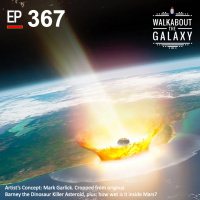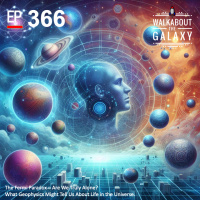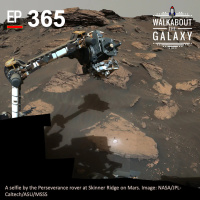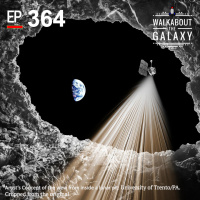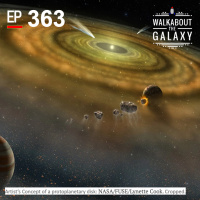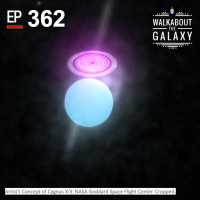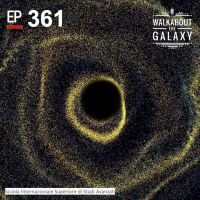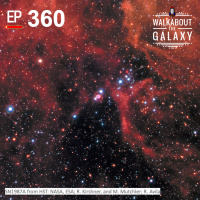Synopsis
An irreverent and informative tour of the latest, greatest and most interesting discoveries in astronomy.
Episodes
-
Making Big Blobs is Hard
11/12/2024 Duration: 37minTop quark Jim Cooney explains why making big blobs is hard and how new observations are helping us understand how the universe made big immensely big blobs more commonly known as giant elliptical galaxies. Nature loves to make a disk, and we love to tell you all about the cool things nature does, including a solid state greenhouse on ancient Mars that may have produced a huge buried supply of water to create giant rivers near its south pole. Join us for this and more mind-blowing stuff. It's all part of our Walkabout the Galaxy.
-
Neutrino Fog and the Hunt for Dark Matter
27/11/2024 Duration: 43minIt's a good news bad news story with the detection of the neutrino fog. This signal from solar neutrinos may confound our search for certain dark matter candidates, but at least we know our detectors are very, very sensitive! We also take a look at magnetic fields in the outer solar system, specifically why Uranus's magnetosphere was so weird when we visited in 1986, and what tiny grains from a near Earth asteroid may be telling us about the magnetic field four and a half billion years ago. Join us for all that, and of course space news and stupid trivia.
-
Not All Supernovae Are Created Equal
20/11/2024 Duration: 41minIf you're speaking English, not Latin, do you really have to say "supernovae" instead of "supernovas"? Also, they are, in some sense, created equally: explosion of a white dwarf, but the outcomes are not all equal. You are welcome for this grammatical tangent, and please enjoy our fun discussion about weird tesserae (more Latin!) on Venus and the whole standard candle story of type 1a supernovae gets a rewrite. On this episode of Walkabout the Galaxy, you can also enjoy solar energy/spacecraft trivia, space news, and general hilarity at no extra charge.
-
Is There Another Belt of Comets?
06/11/2024 Duration: 42minNew observations contradict earlier studies about the possibility of another belt of comets orbiting the Sun twice as far away as Pluto. We'll take a look at what's what in the outer solar system and also explore whether black holes may help explain the Hubble tension. We also play FLOD (Flyby, Land, Orbit, Destroy) and have some "how many planets" trivia.
-
Trojan Asteroids Everywhere
30/10/2024 Duration: 28minJoin Strange and Down quarks for a close look at Trojan asteroids, the forgotten asteroids of the solar system. NASA's Lucy mission is en route to take our first close look at these denizens of the outer solar system and has an Earth gravity assist in December 2024. As you'll see in our trivia, the numbers of Trojans may surprise you. Jupiter is the king of the Trojans, but we'll take a closer look at the first comfirmed Trojan of Saturn.
-
Basin Instinct - Cosmological Structure and Edible Asteroids
23/10/2024 Duration: 45minWe get a tour of our place in the grand cosmological scheme of things with new mapping of the local Basin of Attraction. Spoiler: also Jim's new stage name. And we explore the final frontier of In Situ Resource Utilization with studies of how to get edible nutrients from the raw materials in asteroids. It's a little bit gross. Plus space news, trivia, and more. Join us to learn about all this (and all of our new stage names).
-
OG Top Goes to Europa
09/10/2024 Duration: 50minOriginal Top Quark Dr. Tracy Becker returns to her old stomping grounds to hang with the Walkabout crew and send Europa Clipper on its way to Jupiter. Join us for a preview of this mission's ambitious goals and the exciting journey it took to the launch pad. Also, new research suggests the Earth may escape a fiery death when the Sun becomes a red giant. We have, of course, space news, space history trivia, and much more.
-
Back in Black Holes
02/10/2024 Duration: 47minWe’ve got mini black holes as potential dark matter candidates and monstrous black holes spewing jets to cosmological scales. Who better than Top quark Jim Cooney to take us through these black holes? No one, that’s who. We take a deep dive into meteorites, particularly those that have come from Mars. You may be surprised to learn how many we have, and now we know more about where those free Mars samples originated from on the red planet. Join us for all this, space news, and trivia.
-
Black Hole Spindown Chirp and a 9-Day Geologic Rumble
18/09/2024 Duration: 41minGravitational waves may provide a new way to observe supernovae in our own Milky Way galaxy and determine when they produce black holes and when they result merely in neutron stars. Closer to home, scientists did some clever detective work to figure out the source of a mysterious 9-day seismic shaking here on Earth. The culprit: a giant, regular sloshing in a fjord triggered by a landslide as a result of warming temperatures and melting land ice. Join us for this and other astro news including an interesting mini-moon and funny science lingo.
-
Recent Lunar Volcanic Activity and the Metallicity Cliff
11/09/2024 Duration: 46minTiny samples brought back from the Moon hint at surprisingly recent volcanic activity. What's up with that?! Elsewhere in the galaxy, a detailed study of over 100,000 stars identifies the metallicity cliff. This is where stellar composition that is low in heavy elements seems to inhibit the formation of at least some types of exoplanets. The astroquarks have all the details for you, as well as a Polaris Dawn update and nerd trivia. Join us, won't you?
-
Adventures in Space the Cady Way
04/09/2024 Duration: 38minThe Astroquarks are joined by former NASA astronaut, PhD Chemist, and retired USAF Colonel Cady Coleman at Dragon Con 2024 for a wide ranging discussion of space flight, institutional challenges, training, flute playing, and more.
-
Ocean World Mimas and the JUICE Slingshot
28/08/2024 Duration: 46minRecent (astronomically speaking, of course!) perturbations to Mimas's orbit may be the explanation for the surprising presence of a global subsurface ocean in this tiny moon of Saturn. Meanwhile, the European Space Agency's JUICE (Jupiter Icy Moon Explorer) mission successfully completed a novel gravity assist making use of the Earth's Moon and the Earth to send it towards... Venus! We have all the explanations, space travel stumpers, trivia and more.
-
Barney the Dinosaur Killer from Outer Space and Water Inside Mars
21/08/2024 Duration: 40minNew research shows that the asteroid that killed the dinosaurs some 66 million years ago formed in the colder, more distant reaches of the solar system. The Astroquarks have taken it upon themselves to dub this asteroid Barney. We’ll update you on that new research and a surprising discovery from Mars Insight data that suggests Mars has a potentially huge amount of delicious H2O not to far beneath its surface. It’s just a bit dirty, is all. And we have lots of space news, stumpers, and more. Join us, won’t you?
-
The Fermi Paradox - Are We Truly Alone?
14/08/2024 Duration: 41minWhen Frank Drake created his famous eponymous equation to estimate the number of advanced communicative civilizations in the Milky Way, we had little more than educated guesses for most of the factors in that equation. Decades later we have much better data, and the answer seems to reinforce Fermi's famous paradox: why is our galaxy so silent? The role of plate tectonics in enabling evolution of advanced life forms is examined in new research were a revision to the Drake Equation is proposed, and the unsettling answer may be that we are truly alone.
-
Chemical Whispers of Life on Mars
31/07/2024 Duration: 41minThe astroquarks assemble for their 365th episode, about 10 years after their first, with a look at a canceled mission to the Moon and tantalizing observations from an ongoing mission at Mars. The Perseverance rover has spied a particularly unusual rock sample with some tantalizing features. Join us for the deets as well as historical astronomy trivia, space news, and more.
-
Lunar Caves for Future Habitation
18/07/2024 Duration: 25minIn this light episode of Walkabout the Galaxy, Josh and Audrey discuss the first confirmation of open spaces in lava tubes connected to lunar pits on the Moon. 200 lunar pits have been observed on the Moon, and now scientists have used radar data to demonstrate that these pits are in fact connected to caverns that could provide future astronauts with a safe haven beneath the lunar surface. Join us on this short walkabout for the full story, trivia, and space news updates.
-
Dark Matter, Deuterons, and a Mixed-Up Protoplanetary Disk
11/07/2024 Duration: 42minYou'll be amazed at how much we can learn from iron meteorites. Who would have guessed that analysis of the compositions of these humble metallic remnants of asteroids would be able to tell us about the shape of the protoplanetary disk? We'll learn about the latest clues to the early history of our solar system, the surprising abundance of deuterons in cosmic rays provides another indicator that we still have a lot to learn about the early universe, and dark matter - well it's still out there, still dark. Join us for all this, space news, nerdy trivia and more.
-
Cygnus X-3 and a Naked-Eye Nova
27/06/2024 Duration: 41minThe clock is ticking on T Coronae Borealis which seems primed to undergo a nova explosion this summer. That will make this otherwise faint star as bright as Polaris thanks to a burst of nuclear fusion reactions on the exposed surface of this white dwarf. Another curious binary system, Cygnus X-3, is beaming x-rays toward us thanks to some nifty photon processing in the disk surrounding this black hole. Learn more about these cool systems, parallel universes, dense moons and more with your friendly neighborhood astroquarks.
-
Primordial Black Holes Make the Galaxy Go 'Round
20/06/2024 Duration: 39minWe take a look at some Beta Pic Disk shots before journeying back to the earliest era of the universe and the possible formation of primordial black holes. Some of these may have been only the size of an atom and would have long since evaporated through Hawking radiation. But they may have left an observable imprint for our powerful telescopes peering into the distant past, and their larger siblings are a possible contender for dark matter. Join us for all this, space news, silly trivia, and much more.
-
Full Circle to the Origins of Carbon and Exotic Gravity
12/06/2024 Duration: 43minThe Astroquarks celebrate their 360th episode with discoveries showing carbon much earlier in the universe than previously thought possible, and an exotic new proposal as an alternative to dark matter. Plus, we have radioactive trivia and a slew of space news with a busy week in rocket and spaceship activity.













